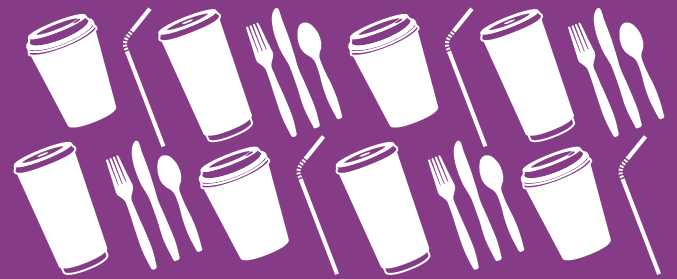Single-use plastic alternatives
The Queensland government has banned single-use plastics from 1 September 2021. So now is the time for cafés, restaurants, takeaways and supermarkets to start finding alternatives (and there are penalties). There are a few exemptions.
It’s estimated that these single-use plastics account for about 40% of plastic waste and only about 12% of plastics recycled in Australia in 2020. The major problem with single-use plastic items is that they are very difficult to recover for re-use, even as fuel to replace thermal coal. Reducing these single-use plastics will reduce material use, reduce landfill and improve our impact on the environment and wildlife.
While it may be convenient and cheap for business to use single-use plastics, the reality is that the material, energy and long-term disposal all have a long-term effect on our environment. Somes end up in landfill (which is bad in itself), and the remainder ends up in the gutter, on our streets, in waterways and our oceans – where they don’t degrade, and can be dangerous for wildlife and the environment.
Some business owners are probable cursing this change because they have existing stock of plastic straws, cutlery, takeaway cups, straws and bags… but the good news is that there are now plenty of plastic-free alternatives, and new packaging options are coming on the market (such as mushroom, seaweed, sugar cane, pressed hay and banana leaves).
- Plastic-free straw alternatives include paper, compostable plant-based, bamboo, and edible pasta and rice straws. There are also reusable straws made of glass, stainless steel and silicone. Even better, you could encourage your clientele not to use straws or make them opt-in (rather than serving with straws).
- Plastic-free drink stirrer alternatives include recycled wood and bamboo. For some drinks, you can even use a healthy celery, carrot or cucumber. Spoons and glass stirrers are also a good reusable substitute.
- Plastic-free cutlery alternatives are traditional metal utensils, and for takeaway there is bamboo cutlery and wooden chopsticks.
- Plastic-free cup alternatives include BYO cup, bioplastic* cups, and traditional paperboard sauce/sample cups
- Plastic-free plate, bowl and food container alternatives include traditional porcelain/ceramic plates. For takeaway, there is traditional paperboard for boxes, trays and wedges; and now palm leaf and bamboo plates and bioplastic* alternatives. There are also sugarcane clamshells, trays and bowls.
- Plastic-free food wrap alternative is beeswax paper.
- Non-single-use bag alternatives include BYO reusable plastic bags and cloth bags (tote, canvas).
Single-use cups, lids, dome lids and loose expanded polystyrene packaging may be banned in future. Why not consider replacing these now.
- Plastic-free coffee cups and lids can be substituted by traditional porcelain/ceramic cups, paper cups and bioplastics*. Asking clients to BYO cup or mug, or not providing the lid might be a useful choice.
* Bioplastics (made from plants) are a great alternative to single-use plastics, although they do require commercial-grade recycling programs to break them down. The main benefit is that biodegradable plastic becomes water and carbon dioxide when it decomposes.
It is hoped that alternatives to single-use plastics for fresh fruit, meats and groceries will soon become available too.
Please contact us or call 3366 8166 to discuss your packaging design needs.

